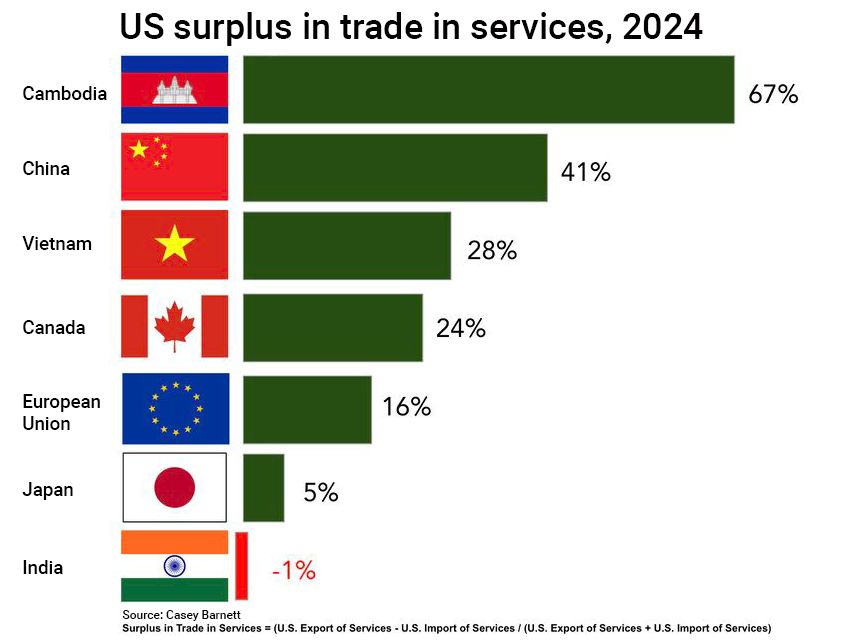


Cambodia came to international prominence this month with US President Donald Trump slapping a “reciprocal tariff” of 49% on the Southeast Asian nation, still classified as a least-developed country ( LDC ) by the United Nations.
Among the dozens of other trading partners hit, the only other country to fare worse was the tiny African nation of Lesotho ( 50% ), another LDC.
Much has been made of America’s historical amnesia. It bombed Cambodia extensively between the mid-1960s and 1975 when Pol Pot overthrew a corrupt US-backed regime exactly 50 years ago on April 17 last week, leading to the deaths of about a third of the population. The civil war ended only in 1998.
Now the head of the American Chamber of Commerce in Cambodia has weighed in with a commentary on America’s trade surplus in services, estimated at almost US$300 billion last year.
Amid all the merchandise trade hoopla from Washington this month, this trade imbalance in America’s favour has been ignored by Trump’s circle of policy advisers and spin doctors.
AmCham Cambodia president Casey Barnett, who also serves as president of Cam-Ed Business School in Phnom Penh, notes that America’s exports of services have grown from 24% of total exports in 1960 to 35% in 2024.
“This reflects America's comparative advantage in knowledge-based sectors: technology, financial services, IP licensing, and consulting,” he observes in a commentary posted on LinkedIn on April 21.

‘US should keep in mind what it does best’
“This also hints at continued US economic dominance as these fields are highly scalable, enjoy higher profit margins, and are relatively less capital-intensive,” Barnett adds.
“The trade-off may be worthwhile, as services typically produce much higher revenue per worker. In resolving its global trade deficit, the US should keep in mind what it does best and eliminate barriers to trade in services.”
Barnett’s post is accompanied by simple calculations of the terms of services trade for seven of America’s trading partners ( US exports of services – US imports of services ÷ US exports of services + US imports of services ).
The AmCham chief calculates that Cambodia had the worst terms of services trade with the United States among these economies last year followed by China, Vietnam, Canada, the European Union and Japan. America had services trade surpluses with all.
Among the seven trading partners selected, only with India did America suffer a ( relatively small ) deficit in services trade.
Barnett derives his numbers mostly from the Bureau of Economic Analysis ( BEA ), part of the US Department of Commerce.
According to the BEA, America’s overall surplus in services trade was US$293 billion last year. That offset the goods trade deficit of US$1,211 billion and reduced the overall deficit in both goods and services to only US$918 billion.
The BEA says America’s exports of services last year were led by business services ( financial, telecoms, computer, information and other services ), followed by travel services, charges for use of intellectual property, and transport services.
The bureau says America’s biggest services trade surplus last year was with the EU ( US$76 billion ) followed by Ireland ( US$62 billion ), Canada ( US$35 billion ), China ( US$32 billion ), Singapore ( US$27 billion ), Brazil ( US$22 billion ), Switzerland ( US$21 billion ), the Netherlands ( US$18 billion ), Australia ( US$16 billion ), Saudi Arabia ( US$9 billion ), Korea ( US$11 billion ), and Japan and the United Kingdom ( both US$4 billion ).
While Barnett notes that “US manufacturing outsourcing has mainly been due to labour costs”, it seems that Wall Street, Silicon Valley and Hollywood are doing just fine.